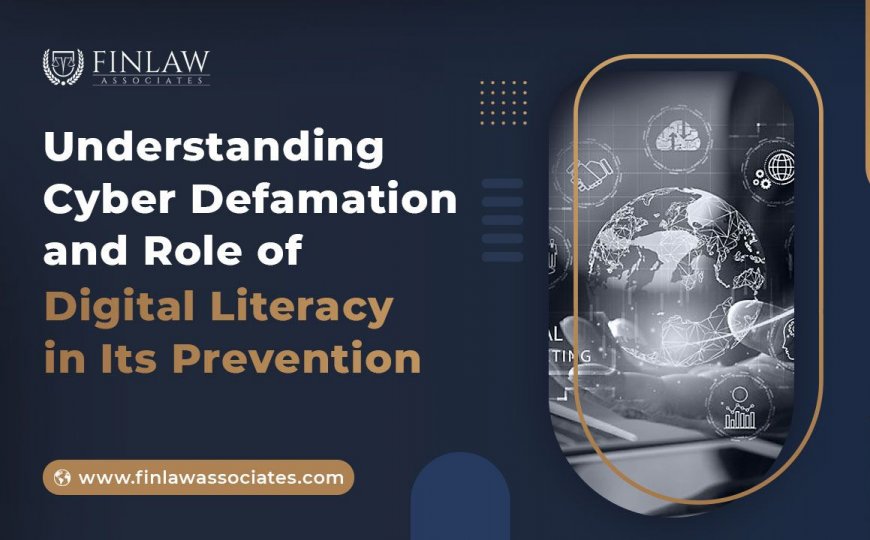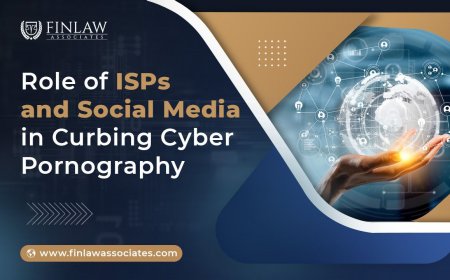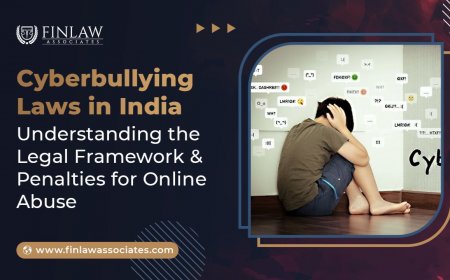Understanding Cyber Defamation: The Role of Digital Literacy in Prevention
Learn how digital literacy can help prevent cyber defamation and explore strategies to protect yourself and your reputation in the digital age.

Cyber defamation is becoming more common in today's interconnected digital world, where social media platforms and online forums are significant routes of communication. Cyber defamation, also known as online defamation or cyber libel, is the spread of false and damaging information about a person, organization, or institution using digital media. Unlike conventional types of defamation, which were mostly limited to interpersonal encounters or published materials, digital defamation may reach a worldwide audience in seconds, hence increasing its potential impact and consequences.
Definition of Cyber Defamation
Cyber defamation is the act of producing false claims about a person or organization via digital channels such as social media, websites, forums, or blogs. These remarks can affect an individual's or entity's reputation, perhaps resulting in emotional suffering and financial loss. Unlike conventional defamation, which often entails the publication of false material in print or broadcast media, online defamation spreads quickly and may reach a worldwide audience in a matter of seconds.
Importance of Addressing Cyber-Defamation
Addressing digital defamation is critical for various reasons:
Impact on Reputation: False and destructive remarks can quickly and severely harm an individual's or organization's reputation. In today's linked world, reputations are frequently formed online, and any malevolent information may swiftly harm personal and professional relationships, job opportunities, and general well-being.
Legal and ethical concerns: Cyber defamation presents serious legal and ethical issues about the balance of free speech and the obligation to avoid spreading false information. Laws differ by country, but many countries have legislation in place to protect persons and organizations from defamation, including online forms.
Psychological Impact: Being a victim of cyber defamation can have serious psychological consequences, including stress, anxiety, and sadness. Because internet information is always available, victims may be exposed to cruel words regularly, increasing their bad feelings.
Financial and Business Consequences: Cyber defamation may have negative consequences for corporations and organizations, including diminished consumer trust, revenue loss, and significant legal obligations. Investors, partners, and clients may reevaluate their business relationships in light of negative web material.
Preventative Measures: Addressing online defamation entails taking proactive steps to guard against false claims and disinformation. This might entail monitoring internet information, reacting quickly to misleading claims, and teaching people about appropriate online activity.
Understanding Cyber-Defamation and Its Types
Cyber defamation, also known as online defamation, is the broadcast of false claims or information about a person, organization, or entity via digital networks. These false claims can hurt the target's reputation and may result in legal, financial, and emotional ramifications. Let's go deeper into the sorts and consequences of cyber defamation.
Types of Cyber Defamation
False Statements: This entails intentionally disseminating false information about someone online. False remarks can range from outright falsehoods to twisted facts designed to harm reputation.
Libel: Libel is defamation via written or public remarks. Online, this includes defamatory claims made on websites, blogs, social media posts, or forums.
Slander: Slander is defined as slander expressed through spoken words or gestures. In the internet world, this might happen through podcasts, live streaming, or recorded recordings that include misleading and destructive remarks.
Revenge Porn: A type of cyber defamation in which intimate or sexual photographs or films of a person are posted online without their permission, sometimes with the purpose to shame or disgrace.
Impersonation: Impersonation, often known as identity theft or online impersonation, is the practice of creating phony profiles or accounts to distribute false information or make defamatory remarks while claiming to be someone else.
Negative Reviews and Comments: While reasonable negative criticism is protected by free expression, fraudulent or defamatory reviews and comments made with malicious intent may constitute cyber defamation.
Legal Framework
In India, cyber defamation is largely addressed by the Information Technology Act of 2000 (IT Act) and the Bhartiya Nyaya Sanhita 2023. Here is an outline of the legal framework of cyber defamation in India:
Information Technology Act, 2000
Section 66A: Section 66A of the Information Technology Act of 2000, which covered inflammatory statements conveyed through communication services, was invalidated by the Supreme Court of India in 2015 due to its unclear and overbroad scope. It has consequences for defamation in digital media.
Section 66C: This provision addresses identity theft and is applicable when someone impersonates another person to harm reputation.
Section 66D: Addresses cheating by impersonation utilizing computer resources.
Section 67: Section 67 addresses the publication or transmission of obscene content in electronic form, which may include revenge pornography.
Bhartiya Nyaya Sanhita, 2023
Section 356(1): This section reads “Whoever, by words either spoken or intended to be read or by signs or by Defamation. visible representations, makes or publishes in any manner, any imputation concerning any person intending to harm, or knowing or having reason to believe that such imputation will harm, the reputation of such person, is said, except in the cases hereinafter excepted, to defame that person.”
Section 356(2): Section 356 (2) mentions the punishment for defamation which can be a term that may extend to two years, or fine, or both, or community service.
Section 365(3): Clause 3 of section 365 mentions the punishment in case of any print or engraved material which may be a term that may extend to two years, or fine, or both.
Section 365(4): Section 356 (4) also mentions that if one sells or offers for sale any such printed or engraved substance that contains any defamatory matter while being aware that it contains such matter, they shall be punished with simple imprisonment for a term which may extend to two years, or with fine, or with both.
The Role of Digital Literacy in Preventing Cyber Defamation
Definition of Digital Literacy
Digital literacy refers to the skills, knowledge, and understanding required to effectively use digital technology. It encompasses the capacity to access, assess, produce, and share information via digital platforms responsibly and ethically.
How Does Digital Literacy Help?
Critical Thinking and Evaluation: Digital literacy enables people to critically analyze the material they encounter online, such as discriminating between reliable sources and disinformation or libelous content. Users can improve critical thinking skills to spot potentially libelous claims and prevent spreading them further.
Appropriate Online Behavior: Understanding digital literacy encourages appropriate online interactions. Users learn about the legal and ethical aspects of sharing information, such as the necessity of protecting others' reputations and privacy rights. This understanding promotes deliberate discussion while discouraging the spread of libelous information.
Awareness of Privacy and Security: Digital literacy teaches people about the hazards to their online privacy and the need to protect personal information. Users are more likely to notice and avoid circumstances that might result in identity theft, illegal access to accounts, or the exploitation of personal information to commit cyber defamation.
Effective Use of Social Media: Social media platforms are frequently used for cyber defamation. Digital literacy educates people how to use digital platforms properly, such as understanding privacy settings, reporting abusive content, and engaging in constructive online debate rather than contributing to destructive conduct.
Legal Awareness and Compliance: Part of digital literacy is understanding the legal repercussions of online acts, such as defamation laws. Users are more prepared to identify when information violates legal limits and how to seek legal redress if they are victims of cyber defamation.
Empowerment and Advocacy: Digital literacy enables people to advocate for themselves and others against cyberbullying. Individuals who understand their rights and how to use online platforms successfully can take proactive steps to defend their reputation and help others who have been subjected to online harassment.
Strategies for Combating Cyber Defamation
Here are some effective ways to combat online defamation:
Monitoring and Reporting: Create methods to monitor online material for defamatory claims and give simple routes for reporting such content to platform administrators or law enforcement.
Swift Response: Create mechanisms for reacting quickly to cases of cyber defamation, such as filing takedown requests, obtaining legal counsel, or engaging in mediation to resolve disputes.
Legal Awareness and Action: Educate people about defamation laws and rights. Encourage victims to take legal remedies if required, and push for the enforcement of internet defamation laws.
Positive Content Promotion: Encourage the development and dissemination of positive, factual, and constructive information online to balance defamatory claims and foster a healthy online environment.
Collaboration with Platforms: Partner with social media and internet platforms to improve their rules and algorithms for recognizing and eliminating defamatory information. Advocate for transparent and accountable content moderation processes.
Empowerment via Digital Literacy: Provide individuals with the ability to detect and avoid defamatory information. Encourage responsible sharing and critical examination of information online.
Addressing cyber defamation necessitates a multidimensional strategy that involves encouraging digital literacy, adopting effective anti-defamation tactics, and cultivating a culture of responsible online activity. We can lessen the negative impacts of cyber defamation and create a more pleasant online environment for all users by educating them, providing them with tools to navigate the digital world securely, and lobbying for legislative safeguards against it. Continuous efforts in digital literacy education and pre-emptive actions against cyber defamation are critical for protecting individuals' reputations and building a respectful and ethical digital society.
What's Your Reaction?















